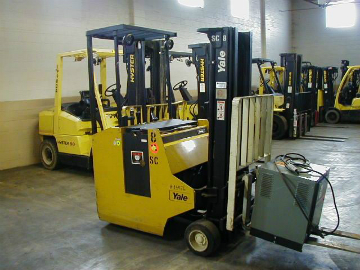When it comes to forklift rental in New Jersey, there are a lot of things that every person has to keep in mind to make sure that the rental experience is safe, smooth, lucrative, and get the required job done successfully. There are numerous kinds of forklift trucks available for rent. So, you need to make sure that you have performed your homework in detail and ensure you get a rental truck well-suited to your specific job. Let us check out six different types of rental forklift trucks that you can consider.
Electric Rider Forklift Trucks
These are available in both stand up and sit down rider configurations. White sit down riders offer comfort to the operator, stand up forklifts are better suited to applications where the operators are getting on and off the trucks several times an hour.
Piggy Back Forklift Trucks
These forklift trucks are designed to be capable of locking on to the back of large over the rod delivery trucks so they may be transported to work places and then be capable of off loading items being delivered using side off loading of the delivery truck. Such kinds of forklift trucks have diverse kinds of configurations to meet the requirements of a specific application. Your supplier for forklift rental in New Jersey and searching the internet can facilitate you to narrow down precisely what model best fits your job requirements.
Vertical Masted Rough Terrain Forklift Trucks
These are best suited to outside applications with rough, uneven or muddy surfaces because of their large high flotation traction type drive wheels. Whereas a telescoping boom forklift is best suited to applications like outdoor construction where reach is needed to position loads on top of structures being constructed.
Sit Down Rider Forklift Trucks With ICE (Internal Combustion Engines)
These forklift trucks come with one of the two kinds of tires – ICE Pneumatic Tires that are better suited to outdoor applications where rough surfaces will be faced, and ICE Cushion Tires that are perfect for indoor leveled surfaces that are good condition. ICE forklifts are available in various fuel types, including CNG (Compressed Natural Gas), Gasoline, Diesel, and LP Gas.
Motorized Hand Forklift Trucks
These forklift trucks are generally operated from a stand up position or from a walking position. Such forklifts can be set up with work-saver forks that are just about 9” wide and the forklift trucks just lift pallet a few inches off the floor. Such forklift trucks are even available in configurations with vertical masts with ITA (Industrial Truck Association) carriages for forks that differ in length and size. A characteristic ITA fork would be four or five feet in width and forty-two feet in length.
Narrow Aisle Forklift Trucks These are the ideal forklift trucks to opt for if you are considering forklift rental in New Jersey with indoor or warehouse tasks in mind, where the space is less than 10 feet. As always, security is the main concern and narrow aisle forklift trucks very much alleviate the risk of injuries to the operator in addition to damage to property while working in tight spaces.

